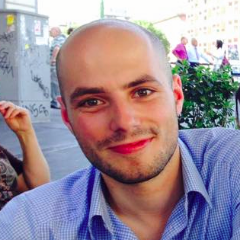"Ah! What a sky! And what a sea!", marvel Butterfly's entourage as they climb the hill in search of B.F. Pinkerton. Torre del Lago is the quintessential setting for Madama Butterfly. The backdrop to the open-air theatre could easily be the gentle hills and bay of Cio-Cio San's own Nagasaki. The broad sky, the rolling Apuan Alps, the unruffled waters of Lake Massaciuccoli where a boat-bound Puccini would fish and make merry with his own gang of bohemians. "Paradise", Puccini thought. "Empyrean Eden".
And yet not all is serene at the Festival Pucciniano. “Nobody likes to admit that they were born into poverty,” remarks Cio-Cio San in Act I, but President Alberto Veronese has been unable to conceal the festival's financial woes. A media storm erupted when the cast for Tosca had its wages cut during rehearsals. Questions are currently being raised about safety at the theatre, where tenor Marco Voleri fell from a podium and fractured his spine during last night's Turandot. It was a comparatively smooth ride tonight, with former festival President Renzo Giacchieri taking the directorial hot seat. He achieves dramatic depth through simple means. A bonsai tree Butterfly, with proportion and grace in reams.
Admittedly, the budget approach sometimes shows. Act I opens to little more than a stark black background with the glowing sliding doors of Pinkerton's love nest to one side. Parking bantering sailors in front to unravel the Stars and Stripes feels like a gratuitous touch, as does the allegorical cardboard cutout of the USS Abraham Lincoln that wheels into view at the end of Act III. Video displays flanking the stage provide Proms in the Park glitz but distract from the action, whilst clusters of decorative panels in Act II display the incongruous combination of an autumnal lakescape and snowy mountains or waves depending on your interpretation. An oblique reference to Hokusai's woodblock print The Great Wave of Kanagawa is the best we can muster.
But in the broader sense, the visuals unpack with finesse. Butterfly and friends enter in variegated silken kimonos, replacing Act I's sailors and bringing the stage to life. The colour intensifies a notch when the cortège toasts Butterfly with a collective unfurling of parasols. Most magical of all was the metamorphosis in Act II, where the barren pseudo-Hokusai panels rotated to create an optic eruption of cherry blossom. Visually dormant patches, in retrospect, felt like a directorial subterfuge to coax transformations into flourishing even more vividly. The Orchestra del Festival Puccini may not be a platinum band, but it sustained an admirable flow. Young conductor Francesco Ivan Ciampa kept a rein on the tempi, turfing out some gaudy tones with muscular beats.
Amongst the visual swathes, a wealth of detail roots our attentions. A kabuki theatre-inspired chorus underlines the prevailing mood with expansive gestures, so that geishas giggle sheepishly when Butterfly cheekily introduces herself as "Madama B.F. Pinkerton", or recoil in shame when she reveals that her father is dead. The solo parts are well-developed even where they do not take the spotlight. Salvatore D'Agata's Goro fans himself furiously, scheming and humming throughout like a bad smell. Laura Brioli's Suzuki watches on anxiously from the wings at the work's conclusion. When Goro's black-clad assistant cajoles Butterfly into swallowing her dagger, justification is given to Suzuki's creeping unease with the marriage broker's constant presence.
Livornese Verdi baritone Alberto Mastromarino painted a world-wise Sharpless in the briny, rough-clad tints of the Tuscan coast, whilst Leonardo Caimi's best Yankee impression made for a smooth Pinkerton, pairing strutting bravado with a lustrous sound. Silvana Froli's performance drew us into the oceanic inner world of her character through the sheer authenticity (and complexity) of human emotion conveyed. Contradictory, unfathomable, her Butterfly was all the more alluring as a result. Vocally, she had suppleness for "Un Bel Dì Vedremo" and horsepower for "E Questo? Egli Potrà Pure Scordare?". Physically, she commanded the stage with economical gestures. A drop of the head on the words "tutto è morto per me" was all it took to communicate a harrowing breakdown. And there was chemistry all round. Never had Pinkerton's incantation of "vieni" had such a titillating double significance than when in a lush duet affront a glowing moon he ushered Butterfly into his love roost.
Undeniably, the sense of being steeped in a Puccinian heritage contributes to the dreamy atmosphere. Visitors can roam the lower rooms of his villa – a private museum run by his only surviving granddaughter – in an electric experience where the smaller details bring the composer to life. The plan is to extend the museum upwards into his bedrooms, though when the funds can be found, qualifies the custodian. As far as stage commemorations go, the case is clear. Intelligent direction trumps blockbuster budgets at the Festival Pucciniano.




